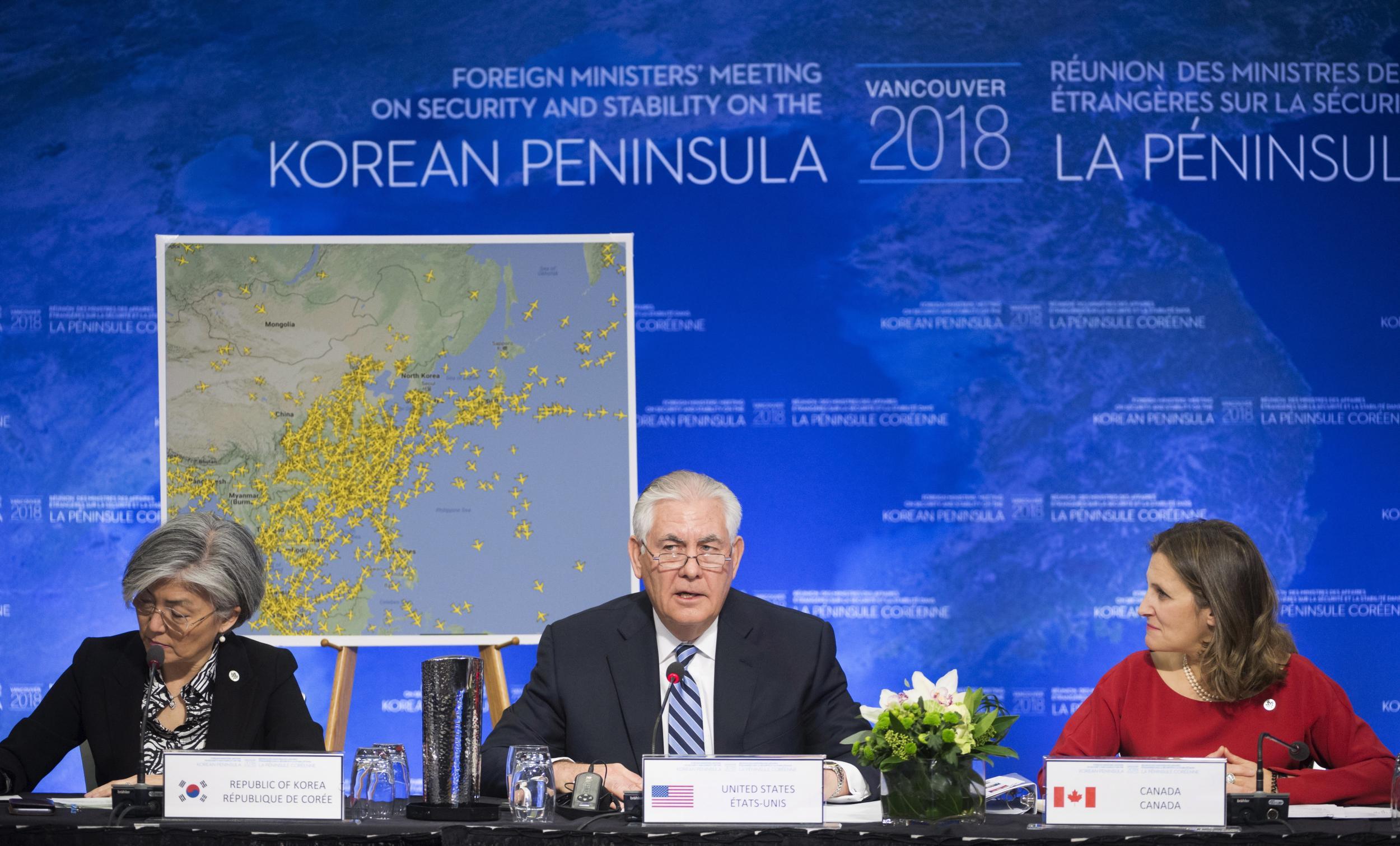North Korea sanctions: World leaders call to keep penalties on Kim Jong-un's regime over nuclear fears
Twenty nations meet to discuss the North's expanding nuclear programme

Participants in a 20-nation summit on the North Korean nuclear threat have called for continued sanctions on the country, in an effort to pressure the regime to give up its rapidly advancing nuclear programme.
US Secretary of State Rex Tillerson, who participated in the one-day meeting in Vancouver, Canada, said the event sent a simple message: "We will not accept a nuclear-armed North Korea."
The sentiment was echoed by Japanese Foreign Minister Taro Kono, who urged the international community not to ease up on North Korea despite its recent cooperation with the South.
"It is not the time to ease pressure or to reward North Korea," he said. "The fact that North Korea is engaging in dialogue could be interpreted as proof that the sanctions are working."
The summit, composed of countries that supported South Korea during the 1950-1953 Korean War, took place as the North and South conducted their first diplomatic talks in years. The talks have so far been limited to North Korea’s participation in the Olympic Games taking place next month in Pyeongchang.
North Korea announces intercontinental missile launch
Show all 13South Korean Foreign Minister Kang Kyung-wha said the talks were a "significant first step towards restoring inter-Korean relations,” but that the North had shown no indication that they were willing to abandon their nuclear programme.
UK Foreign Minister Boris Johnson warned that Korean relations could revert back to normal after the Olympics, adding: "Our job is to help [North Korean leader Kim Jong-un] any way we can to make the right choice."
Mr Tillerson argued that a "maximum-pressure campaign" of sanctions was necessary to guide Mr Kim’s hand.
"We must increase the costs of the regime's behaviour to the point that North Korea must come to the table for credible negotiations," Mr Tillerson said.
The United Nations Security Council enacted stringent sanctions on North Korea last month, hoping to cut the country's energy supplies and starve its nuclear operation. The resolution banned exports of oil products, industrial equipment, machinery, transportation vehicles, and industrial metals to North Korea. It also required the repatriation of North Korean citizens working abroad within two years.
The US has accused China of illegally trading oil ship-to-ship with North Korea on the East China Sea, in violation of the sanctions. President Donald Trump recently tweeted that China had been caught “red handed” allowing oil to go into North Korea.
"There will never be a friendly solution to the North Korea problem if this continues to happen!" the US President said.
Mr Tillerson emphasised the need for maritime interdiction – or efforts to stop the flow of smuggled goods into North Korea – and urged both Russia and China to fully comply with the UN sanctions.
The American diplomat also reiterated his rejection of a Chinese-Russian proposal for the US and South Korea to freeze military exercises in return for a freeze in North Korea's weapons programmes.
Neither China nor Russia – two of North Korea’s biggest trading partners –were present at the meeting, raising concerns about the summit's usefulness. Both countries have criticised the gathering, which China called an example of “Cold War thinking”.
"When we found out about this meeting, we asked: 'Why do you need all those countries together?'" Russian Foreign Minister Sergey Lavrov said at a news conference. "Greece, Belgium, Colombia, Luxembourg. What do they have to do with the Korean peninsula today?"
US officials said Chinese and Russian officials would receive a readout of the meeting afterward.
Additional reporting by agencies
Subscribe to Independent Premium to bookmark this article
Want to bookmark your favourite articles and stories to read or reference later? Start your Independent Premium subscription today.

Join our commenting forum
Join thought-provoking conversations, follow other Independent readers and see their replies